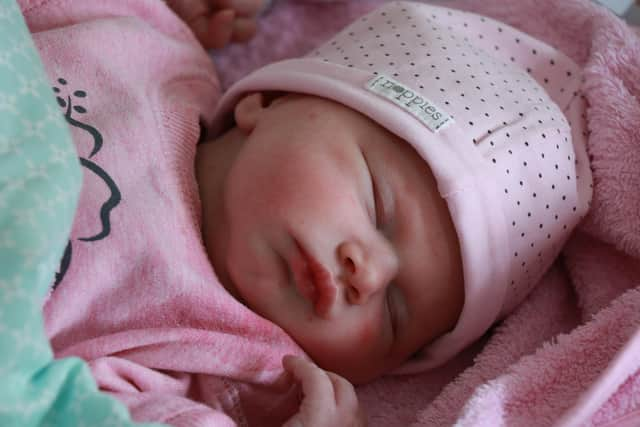We can't let care for Scotland's vulnerable babies slip - Joanne Smith
Securing healthy relationships for babies and very young children has shown to provide the most efficient and cost-effective way of improving outcomes throughout a person’s life. The vision of The Promise – a report produced from Scotland’s independent review of the care system - is that everyone involved in care services and systems are attuned to the needs and rights of children, and work to help families stay together in every case possible.
And, as we mark Infant Mental Health Awareness Week, we want to reiterate NSPCC Scotland’s commitment to contributing to the fulfilment of this vision wherever possible.
Advertisement
Hide AdAdvertisement
Hide AdThe Promise recognises that a good childhood is dependent, above anything else, on having secure loving and consistent relationships.
For young children who are ‘looked after’ the impact of trauma, compounded by placement instability, can leave a lasting imprint on their lives unless intervention is early and evidence based.
The Promise is also clear about the harm caused by poverty and how it increases the chances of children being involved with the care system. It acknowledges that it is the responsibility of government to make sure children have their basic needs met.
That means support for infants and their carers must be holistic and address both the material and therapeutic needs of a family, and take into account the exclusion, isolation and amplified risks caused by having no money.


There is a common assumption that babies and very young children are less affected by traumatic experiences than older children. However, we know that children ‘embody’ experiences well before the development of language, and that trauma experienced, for example through domestic abuse, can be devastating and life-long.
NSPCC Scotland is working to inform the development of early preventative support for families. Our focus is particularly on the unique needs of vulnerable infants in the care system. For over a decade, our Glasgow Infant and Family Team has been working with both birth parents and foster and
kinship carers to support them in developing strong relationships with their children.
By bringing together psychology, social work and the third sector, we have gained valuable insight into the imperative of building an evidence-based understanding of the experience of ‘looked after’ infants. This allows us to represent their best interests in systems designed for their care, protection
Advertisement
Hide AdAdvertisement
Hide Adand wellbeing. We believe the integrated model of care delivered by the infant and family team can provide a sustainable, rights-based model of advocacy for infants and very young children in care.
The approach is being evaluated through a randomised control trial due to report in 2024. If it proves to be clinically and cost effective, it could transform outcomes for young children in care; reduce the number of placement breakdowns and repeat removals; and for the first time provide
robust, Scotland-specific evidence in this area of children’s social care.
We are using learning emerging from the trial to inform the review of the Children’s Hearings System to better reflect the distinct needs of infants. We know that without a specific focus, the needs of babies will be overlooked. Yet one quarter of all children referred to the Children’s Hearings System
on care and protection grounds are infants of less than 20 days old and more than 40% are under the age of five.
We are also working with partners to establish what actions are required, both national and locally, to deliver the Promise for 0- to 3-year-olds. We have strong foundations to build on in Scotland. The importance of the early years is well reflected in national policy, and we have seen some significant
advances. These include the Enhanced Health Visitor Pathway, which sets out the minimum core home visiting programme for families, and the establishment of the Perinatal and Infant Mental Health Programme Board to improve support during pregnancy, birth and beyond. However, there is
a risk that progress towards prevention may be stalling.
New evidence from Public Health Scotland shows COVID-19 is still having an impact on babies, their families and the services that support them and exacerbating underlying inequalities. Of particular concern is the increase in developmental delay in children starting early learning and childcare, following lockdown.
Advertisement
Hide AdAdvertisement
Hide AdInvesting in early childhood interventions is critical to avoid the worsening of inequalities. Yet, recent Scottish Government commitments around a revised national vision for mental health, the Whole Family Wellbeing Fund, and the creation of a National Care Service have failed to have a specific focus on the early years. The pandemic dictates we respond swiftly to growing need but we must balance this with a strategic, longer term, evidence-based approach to improving outcomes for babies, children and families.
If we are serious about keeping The Promise, we must invest in the critical window of opportunity, which exists in the early years, because there’s hope of recovery for maltreated babies, especially if they receive timely and effective support. But the earlier this happens the better.
Only by providing a continuum of care to families, from community support to specialist care, can we truly maximise the potential for lifelong emotional and physical wellbeing for Scotland’s babies. If we get it right for babies, we will be delivering The Promise aspirations for many generations to
come.
Joanne Smith is Policy and Public Affairs Manager for NSPCC Scotland
Comments
Want to join the conversation? Please or to comment on this article.
